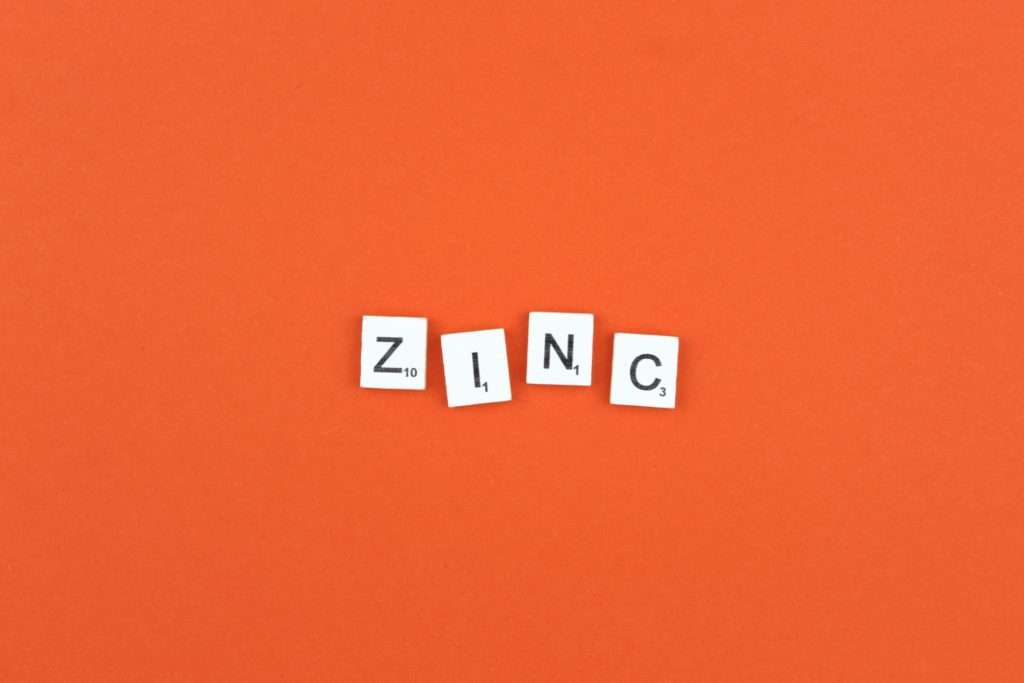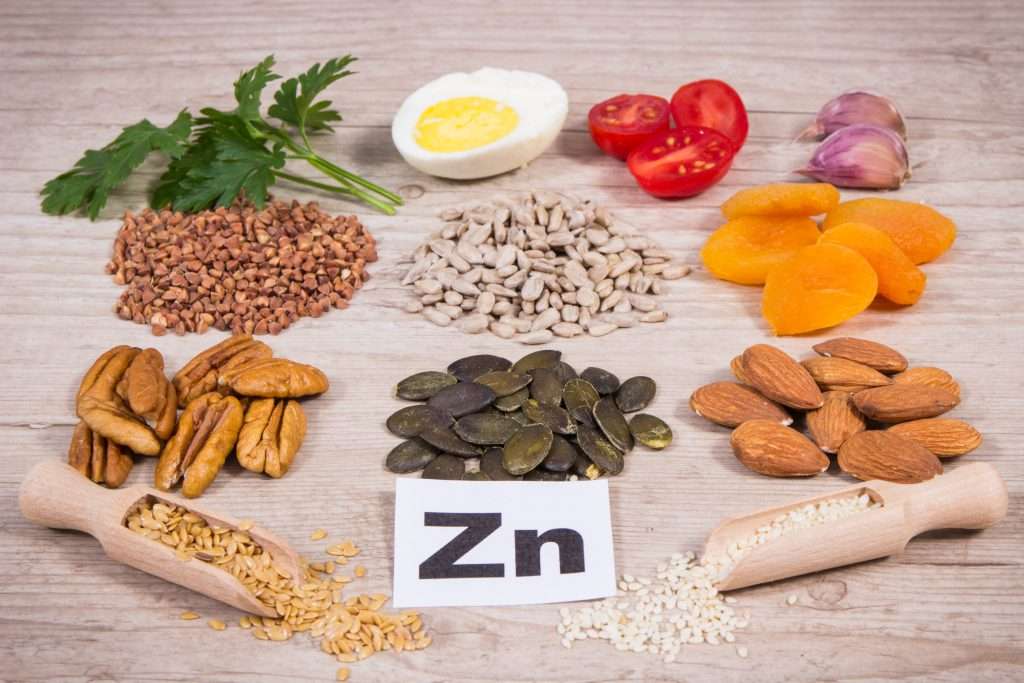Zinc - vital trace element
Zinc is an essential trace element that is vital for the human body!
It is found in the skin, hair, eyes, liver and bones as well as in the male reproductive organs.
However, zinc cannot be produced by the body itself and can only be stored by it in small quantities, which is why it is very important to ensure a regular intake through food.

What tasks does zinc have in the body?
Zinc is THE trace element for our immune system and is indispensable for it!
Among other things, zinc is important for cell division, wound healing, the binding of free radicals, lowering blood sugar levels, the formation of hemoglobin (red blood pigment), the transport of oxygen and carbon dioxide in the blood, hormone formation and the formation of sperm.
It is also a component of many enzymes and is therefore involved in numerous metabolic processes. Without zinc, these processes would not take place or would be interrupted.
Zinc also helps to detoxify the body and eliminate mercury.
1. zinc supports the immune system
Zinc plays an important role in the functioning of the immune system. It has been shown to regulate and support a healthy immune response and protect against infections and diseases.
Firstly, zinc is an essential component of many proteins in our body, including those involved in the immune system. Here, zinc contributes to the production of cytokines - proteins that are important for regulating the immune system.
Secondly, zinc has a direct effect on our T lymphocytes - white blood cells that play an important role in the defense against disease and infection. Zinc helps these cells to divide and differentiate so that they can fight off invading pathogens.
2. zinc contributes to cell division
Zinc is an essential trace element for cell division as it helps to maintain the integrity of the cell membrane. It also plays a role in DNA replication and repair and enables cells to divide and grow properly. Zinc is also involved in transcription and translation, which are important parts of the cell cycle and are required for successful replication.
Because zinc is an important element in cell division, brittle nails, hair loss and flaky skin are a sign of an unmet zinc requirement.
3. zinc helps with wound healing
Zinc helps with wound healing in many different ways. First of all, it helps regulate inflammatory responses during the healing process and stimulates the production of collagen, an important structural protein in the body. Finally, zinc supports the granulation of wounds and increases the rate at which new tissue is formed.
4. zinc is an important antioxidant
Zinc is an important antioxidant that helps neutralize free radicals, molecules that can damage cells and DNA.
It binds to the molecular structure of the free radical, changes its shape and makes it less reactive. This ensures that the cells are protected from the oxidative damage caused by these molecules.
5. zinc regulates the blood sugar level
Zinc is important for regulating blood sugar levels in the body. It helps to break down glucose and store it as glycogen in the muscles and liver. Zinc also helps in the production of insulin, which plays a key role in regulating the uptake of glucose from the bloodstream into the cells so that it can be used as energy.
6. zinc is important for the formation of hemoglobin
Zinc plays a crucial role in the formation of hemoglobin, a protein molecule in red blood cells that transports oxygen throughout the body. Zinc contributes to the activation of vitamin B6, which is necessary for the synthesis of pyridoxal phosphate (PLP), an important component of hemoglobin. PLP is involved in the conversion of iron from food into the form required for hemoglobin.
Zinc also increases the production of red blood cells and helps to reduce anemia, which is often caused by zinc deficiency. It does this by supporting the absorption of iron from the intestine, which is then converted into hemoglobin.
7. zinc is important for the production of hormones
Zinc is important for the production of many hormones and other important chemicals in the body. It is an essential trace element for hormone production as it helps regulate gene expression and facilitates the synthesis of proteins involved in hormone signaling pathways. In addition, zinc is required for the modification of hormone precursors so that they can be metabolized.
8. zinc is important for the formation of sperm
Zinc plays an important role in the formation of sperm, as it helps to regulate several important processes involved in sperm production. It helps to protect the sperm's DNA so that it can travel through the reproductive system undamaged. Zinc is also important for sperm motility, as it helps to ensure that the sperm's tail is strong enough to propel them forward.
Finally, zinc is also important for maintaining the normal shape and size of sperm so that they can fertilize an egg.
9. zinc supports the metabolism
Zinc helps to catalyze the biochemical reactions of proteins, fats and carbohydrates so that the body produces energy. Zinc also ensures better absorption of other vitamins and minerals in the body.
10. zinc helps to eliminate heavy metals
Zinc enables the synthesis of the metal-binding protein metallothionein, which makes it easier for the body to excrete heavy metals directly. Zinc transports this protein, to which the toxic substances bind, through the body to the kidneys, where it is then excreted. An additional supply of zinc and selenium is often sufficient for this.
How much zinc should be taken daily?
Zinc does not need to be taken in large quantities, but it does need to be taken in regularly with food.
According to the DGE, the daily zinc requirement varies between seven and 16 milligrams depending on gender.
The following recommendations apply:
- The daily zinc requirement for men is between 11 and 16 milligrams.
- The daily zinc requirement for women is between 7 and 10 milligrams.
- During pregnancy and while breastfeeding, the daily requirement of zinc is somewhat higher and is between 7 and 14 milligrams.
The fluctuations result from the daily phytate intake (more on this in the following section).
This is what you need to know as a vegan with regard to zinc:
People who eat a predominantly plant-based diet generally need more zinc, as phytic acid, which is mainly found in seeds, pulses, nuts and cereals, inhibits the absorption of zinc by binding it, which means that the body no longer has enough of the trace element available.
This results in a guideline value of 14 - 16 mg zinc per day for men and women.
8 - 10 mg zinc per day for women, depending on how much unfermented, non-sprouted food is eaten.
However, milk drinkers should also consume enough zinc, as the casein contained in milk and the high amount of calcium and phosphate also hinder zinc absorption.
8 signs of a zinc deficiency:
- Impairment of the immune system
- Poor wound healing
- Hair loss and brittle fingernails
- Skin problems such as eczema or acne
- Constant tiredness, lack of concentration and drive
- Growth disorders in children and adolescents
- Abnormalities in the perception of taste or smell
- Night blindness
Causes of zinc deficiency:
A zinc deficiency can have many causes. Even people who already lead a healthy lifestyle can suffer from one. Some of the causes are listed below:
- Foods containing too little zinc: Vegans and vegetarians in particular should ensure that they take a regular and well-measured intake of zinc. This is because, in addition to the lower amount of zinc in plant-based foods compared to animal-based foods, plant-based foods contain more phytic acid, which inhibits zinc absorption.
- Competitive athletes need more zinc because their muscles are under a lot of strain and the increased exertion means that some of the trace element is lost through sweat.
- During excessive stress, the synapses switch to high performance. In order for the connections in the brain to pass on the correct commands during this time, the body needs zinc. It is therefore not surprising that the zinc level drops quickly under excessive stress, which also reduces general resilience.
- During a gastrointestinal illness, especially with diarrhea, important trace elements and minerals are quickly lost. This is doubly bad with regard to zinc, as the trace element is lost and the body is less able to absorb it due to the prevailing inflammation in the gastrointestinal tract.
- People who suffer from gluten intolerance should also ensure that they have a sufficient supply of zinc, as the intestine cannot utilize it.
- If you increase your calcium intake, you should also monitor your zinc balance, as calcium can impair the absorption of zinc.
As only a very small proportion of the zinc present in the body is found in the blood, the rest is stored in muscles and bones, a zinc deficiency is difficult to measure. Therefore, if a zinc deficiency is suspected, you should simply increase your daily intake of zinc for a certain period of time, ideally in consultation with your family doctor. If the condition then improves, there was probably a zinc deficiency. If there is no improvement, the cause should be investigated further.
Can I overdose on zinc?
An overdose of zinc normally only occurs if the nutrient is taken in large quantities over a longer period of time.
What is zinc poisoning?
Zinc poisoning occurs when there is a severe case of zinc overdose. However, the zinc level must be very high (200 - 400 mg), so this is rather rare and most likely to affect welders who do not wear a respirator mask during work. Zinc poisoning manifests itself as high fever, chills, malaise and headaches.
Which foods contain zinc?
Zinc is mainly found in animal foods such as oysters, beef, pork and chicken. However, vegetarians and vegans can also find many good sources of zinc, such as nuts, wholegrain products and pulses. It should be noted that zinc in plant-based foods is usually bound to phytic acid, which inhibits the absorption of the trace element. Care should therefore be taken to ensure that a sufficient amount of zinc is consumed.
Pumpkin seeds
8 mg/ 100 g
Spinach
7.4 mg/ 100 g
Sesame seeds
7.5 mg/ 100 g
Lenses
7 mg/ 100 g
Yogurt or kefir
5 mg/ 100 g
Cashew nuts
5 mg/ 100 g
Quinoa, cooked and raw
3 mg/ 100 g
Wheat germ, roasted
10 - 12 mg/ 100 g
Chickpeas, cooked and raw
2 - 3 mg/ 100 g
Hemp seeds
7 mg/ 100 g
Oatmeal
3.5 mg/ 100 g
Sunflower seeds
5.5 mg/ 100 g
Is it necessary to supplement zinc?
In principle, the body does not need additional zinc if it is supplied with a balanced and varied diet. Nevertheless, vegans and vegetarians in particular should take care to supply the body with sufficient zinc, which can easily be done with the help of supplements. It also makes sense for people suffering from an acute zinc deficiency to take additional zinc supplements, at least temporarily.
You can also watch the video on zinc:
The video describes zinc very well with the following points:
Zinc deficiency is difficult to detect because there are many symptoms that can be misinterpreted.
Zinc has many important tasks in the body:
- Hormone balance
- Fertility
- Skin, hair, nails
- Wound healing
- Immune system esp. formation of white blood cells
- Performance - University of Texas
- Ability to concentrate
- helps with nervous weakness, depression, anorexia
Zinc can help to get rid of a cold more quickly. It has an anti-inflammatory effect and can help prevent autoimmune diseases.

